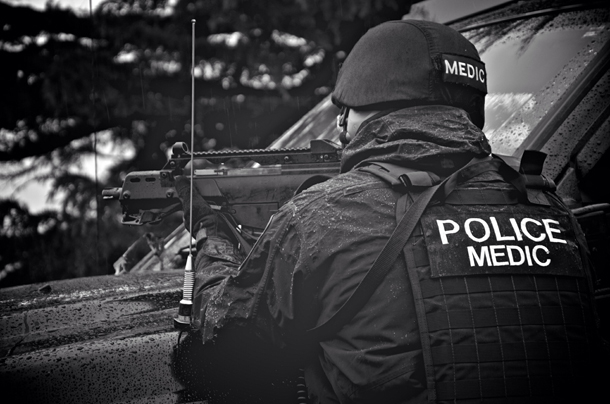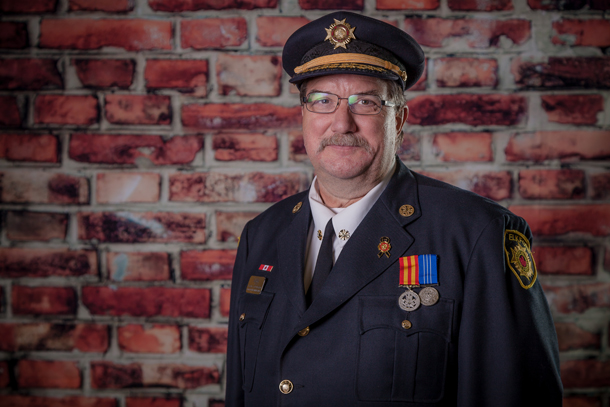On April 20, 2015, Jason Driscoll of Langley took his own life at 44. He had worked 13 years as a paramedic before changing careers.
But the job stayed with him.
"Jason had a difficult time attending calls that involved children," his widow Melynda Milligan told The Tyee. "He often would wake up with nightmares, soaked and screaming or crying in his sleep."
"How can they attend these horrific scenes and not have help given to you immediately when you need it?" she asks. "If it was available, I believe Jason would be here today. Our lives will never be the same."
Battle scars
Like most Canadian firefighters, Bernie Van Tighem watched with alarm as the wildfire nicknamed "the beast" forced Fort McMurray's 94,000 residents from their homes over the past two weeks.
The fire chief of Elkford, British Columbia -- a small town 120 kilometres southwest of Calgary -- fought fires in Alberta and knows many of those people battling the massive blaze.
And after three decades as a firefighter, Van Tighem also knows the emotional scars those battles can leave. Horrific scenes from calls as far back as 1987 have been burned into his memory, replayed in nightmares and debilitating flashbacks that sometimes left him frozen during emergency calls.
For more than a year, the 54-year-old has been unable to work because of post-traumatic stress disorder (PTSD), a mental illness caused by exposure to trauma involving death or serious injury, according to the Canadian Mental Health Association.
Van Tighem has a warning advice for his comrades fighting the beast.
"They have to believe that they're doing everything they can to make it better," he tells The Tyee. "It's a disaster that's of none of their making -- but it's going to impact them.
"They need to be able to talk to their teammates, to express their feelings, and allow themselves and each other to feel what they feel."
Alberta's firefighters can count on one thing that Van Tighem can't. Unlike B.C., Alberta has passed a law that presumes emergency responders will likely experience trauma and ensures they get speedy support and help from the Workers' Compensation Board.
"I can't remember how many times I've said, 'I wish I had my breakdown when I was living in Alberta,'" he says. "If you're a first responder in B.C., you're screwed."
A private member's bill that would bring the same "presumptive" approach to B.C. is before the Legislature. Alberta has had a presumptive clause for PTSD since 2012; Manitoba adopted a similar amendment last June.
But private member's bills rarely pass, and change can't come fast enough for Van Tighem.
"Stigma kills first responders," he says. "Our guys are still killing themselves. But the more we speak out, the more acceptable it is to seek help."
For Van Tighem, three incidents are particularly haunting. As a new firefighter, he was called out to a train wreck and helped remove charred corpses, melted into their seats, out of the scorched wreckage. Another call led to a scene where falling logs had crushed a victim's skull. And in the third, a suspect wrestled for control of a police officer's gun while paramedics shielded his daughter from harm.**
Van Tighem was diagnosed with PTSD in 1996. But WorkSafeBC has denied benefits, partly because several of the contributing incidents occurred in Alberta and not within the previous year.
But it wasn't until Van Tighem took over the Elkford fire department eight years ago that his trauma overwhelmed him. In a small town, the fire chief knows almost everyone. Any serious incident almost certainly brings you face-to-face with a dead or injured friend or acquaintance.
On April 19, an appeal board turned down Van Tighem's claim for compensation for work-related mental disorder.
It was a tough blow. Without provincial support, Van Tighem is watching his financial situation worsen as he travels to frequent counselling sessions and struggles to return to his job.
"I'm spending my savings and going broke slowly," he says. "My situation is confusing for them. It shouldn't be, but it is."
Van Tighem said that WorkSafeBC asked him "question after question after question for months," but didn't provide "any help, care, or assistance" to help him cope with the triggering effects of the questioning.
"A first responder shouldn't have to be forced to dredge through this horrific crap without any support, just to prove that they were injured at work," he says. "That should be the presumption."
Jennifer Leyen, WorkSafeBC's director of special services, said that is not how it's supposed to work.
First responders have "challenging and sometimes dangerous jobs" and often experience traumatic incidents, Leyen agreed. They should only have to tell their story once to a psychologist or psychiatrist "well-equipped to make sure they do it with care and compassion, and making sure you have the necessary support to tell your story," she said.
The agency's goal, Leyen added, "is always to ensure they get access to all benefits they're entitled to under the Workers' Compensation Act… It shouldn't be that an injured worker has to prove they have an injury -- the onus under the legislation is on WorkSafeBC. It's an inquiry model where it's our job to investigate and adjudicate."
But as Van Tighem's case shows, there are barriers for those seeking support for PTSD and other mental health issues. And it's not just a matter of whether the trauma occurred in another province.
For example, in 2012 the government began to allow WorkSafeBC to consider the cumulative effect of multiple traumatic incidents. But the agency requires the incidents to have occurred in the last 12 months, denying help to those whose illness is slower to develop.
And the agency delves into the claimant's personal life to see if other factors might have contributed to the PTSD.
Leyen said it can be difficult to decide whether "psychological injuries" are work-related. "They tend to have multiple causes, and often work is only one of the stressors," she said. "When we're talking about our mental health or mental disorder legislation, it can be a little bit more challenging for us to determine what, exactly, is the work-caused part of this injury.
WorkSafeBC last December struck a steering committee to advise it on first responders' mental health issues.
'We've got your back; who has ours?'
Lisa Jennings, 51, remembers her first ride-along with an ambulance crew in 1988.
"Sometimes you hear nuns or priests say they knew it was a calling -- that's exactly what happened to me," she recalls. "I asked the paramedic, 'What do I have to do to do this job?'"
She soon went through training and began working as a paramedic, her dream.
But the darkest calls began to gnaw at her. She had to perform triage on the injured after a tour bus crashed and slid down a mountainside with 26 people on board, deciding who would be treated and who would wait. She's attended stabbings and murders and other "gruesome things."
In 2014, the Victoria paramedic reached her breaking point. She was on a call when she believed another emergency first responder was becoming aggressive toward a patient. Jennings says she intervened and was herself assaulted.
Jennings nearly threw up the next time a call came in, fearing the alleged assailant might also be on scene. In the following weeks, Jennings says she was "really angry, quick to snap at people."
When she drove through a stop sign late one night, she knew something was wrong. And at 3 a.m. she had what she calls a "nervous breakdown."
"I pulled out chunks of my hair," she recalls. "I packed a suitcase with all sorts of weird stuff. I put one cat in the car and wanted to drive the car into Mill Bay and euthanize ourselves."
But Jennings couldn't find her second cat. And that might have saved her life. "I couldn't do it with just two of us," she says. Instead of driving into the sea, she headed to the emergency room where she was diagnosed with PTSD and major depression. After three days in hospital, she was discharged; a month later, the dark thoughts returned.
"From there, I pretty much just lay in bed, severely depressed and suicidal," she says.
Jennings couldn't work. So she phoned WorkSafeBC's Teleclaim line and told her story.
"They asked all these questions," she says. "Then they sent it to a case manager who called and asked more questions. They took six months to make a decision."
That decision was that she had to get another psychological assessment, then another. She's had eight assessments confirming her PTSD diagnosis, she says. But WorkSafeBC denied her claim because of one psychiatrist who concluded "the worker did have PTSD-like symptoms but that there had been no 'catastrophic event,'" according to WorkSafeBC documents. The agency has asked her to seek a tenth assessment to review what she has done since she stopped working.
"I have to constantly be examined over and over and over again, when clearly I am not well," Jennings says. "I have had no treatment or benefits for 19 months.
"The longer WorkSafe is taking, the less chance I'll ever be the same as I ever was. I meet the criteria -- make a decision."
Today, Jennings is living on social assistance. B.C. benefits allow $375 for housing. So for six weeks this spring, she lived in her car in a Walmart parking lot.
Jennings said she knows other homeless first responders. "Nobody is taking care of us," she says. "We've got your backs. But who has ours?"
Two things have given her hope -- her two cats, and her work with other first responders with PTSD to fight for better treatment.
The group helped develop the private member's bill introduced by New Democrat Shane Simpson that would dramatically reduce the barriers to first responders' access to support for mental and emotional issues.
And Jennings and the group was able to meet Labour Minister Shirley Bond, who seemed "sincerely moved" by what she heard. "Wow," Jennings thought, "she really listened."
But nothing has changed. And for first responders like Jennings, there is no time to waste on debate or studies.
"While all this is going on, first responders are living horrific lives and dying at their own hand because of it," she says. "Our first responders keep getting denied or delayed, and wait for years for a decision from WorkSafeBC -- or deciding suicide is the best option."
PTSD can be deadly
"Last year, 13 first responders committed suicide and then, in the last two days of December, three more. This year, we have lost three and two are on life support as we speak," Jennings says. "Why are so many still waiting for years for the acceptance? Why so many denials and appeals?"
Jennings and Simpson admit there are limits to the private member's bill. Some first responders believe the presumptive approach should also be expanded to cover to all work-related mental disorders, not just PTSD.
Brian Leavold has been a North Vancouver fire fighter for 34 years. He is vice-president of the B.C. Professional Fire Fighters Association and president of his association local. He's also worked as a debriefer for firefighters after traumatic incidents and seen first-hand the impact of mental illness on his colleagues.
"Surrey went through a rash of suicides in the last couple years," he says. "That brought it to the forefront."
Reached during a lunch break in a course on treating and preventing mental illness among first responders, Leavold calls the bill a "good first step in the right direction." But he wants to see the presumptive approach applied to other illnesses like depression, anxiety, traumatic stress and any "mental health injury" that's diagnosed by a psychologist.
"PTSD is just one label," he says. "There are all kinds of other issues that may develop for first responders."
WorkSafeBC says that from the date of its landmark reforms in 2012 until the end of 2015, the agency has allowed 292 first-responder mental health claims to proceed and approved and paid out on 154 of them -- a 53-per-cent acceptance rate. Jennings counters that thousands of claims don't make it into the system because they are rejected by WorkSafeBC.
Simpson said he met representatives of police, fire fighters and paramedics before introducing his bill, and learned about their higher-than-average incidence of mental illness and an alarming "spike in the number of suicides," he says.
"These are the most important people in the world for somebody who calls 911 -- they're who they're relying on for the safety and security of their family," he adds. "We need to reach out to them now they're having a tough moment."
His bill states: "If a worker who is or has been a first responder is diagnosed with post-traumatic stress disorder by a physician or psychologist, the post-traumatic stress disorder shall be presumed, unless the contrary is proven, to be an injury that arose out of and occurred during the course of the worker's employment."
Labour Minister Shirley Bond would not be interviewed. But on Feb. 18 she told the legislature she was "concerned" about mental illness among B.C.'s first responders and aware of allegations of "gaps" in WorkSafeBC coverage. The labour and health ministries were working together to identify those gaps, she said.
Bond and Leyen both welcomed the 2012 change that directed WorkSafeBC to include workplace-caused mental health disorders in its coverage and allowed adjudicators to consider the cumulative effect of more than one incident.
But the process requires a formal diagnosis from a psychiatrist or psychologist, which deters some potential claimants.
WorkSafeBC's Leyen said the process "isn't as scary as it might sound."
The assessment is done professionally and with compassion towards clients who "can be very fragile" psychologically, she said, and only have to tell their story once in a "very detailed recounting" of the incident.
The BC Federation of Labour backs the legislation, but hopes to see B.C. extend the presumptive clause beyond PTSD to other stress, anxiety, and depressive effects of workplace trauma. Nina Hansen, the federation's occupational health and safety director, said mental illness is "an invisible but debilitating issue for many workers exposed to traumatic events."
"To expect them to try to jump through the Workers Compensation hoops and appeals just to get compensated, they're being re-traumatized instead of getting the help they need to get back to work," she said. "Presumption would allow them to get help they need quickly, rather than having to fight for it."
Prevention critical
Constable John Smith was the first officer at the scene of a grisly murder 10 years ago. He guarded the victim's mutilated body for hours. After that, the nightmares set in. Every night.
The victim "was coming to visit me in my dreams," he says. "It's tough to shake, that's for sure."
Smith, 52, has worked for one of the Lower Mainland's police forces for 13 years, but asked that it not be identified because he's not authorized to speak on its behalf.
Then things got worse, he says. On the phone, his voice flattens and he pauses. "I'd rather not talk about it," he says. "What could be worse than that? Well, there was something worse."
Short on sleep, he became increasingly angry and felt he was letting younger officers down every day.
"The only thing they got was this caricature of a grizzled Hollywood cop," he says. "The only thing missing was a cigar in my mouth. It was just a struggle to put my uniform on… I'd become disillusioned."
One night in 2014, he made a plan to end his life.

"You wonder why the divorce rates are high in this profession, why the rate of alcoholism is so high, why we just eat our anger, we eat our grief," he says. "It just poisons us."
But something stopped him. Instead, Smith woke his wife up and started an argument, blaming her for his anger, and eventually fell asleep exhausted. The next day, she found him a counsellor and encouraged him to tell his superiors at work what was going on.
"Nobody wants to talk about (mental health)," he says. "There's a fear that if there's a crack in your armour, you're now damaged goods."
His staff sergeant and a deputy chief surprised him. "All right," he recalls one of them replying. "Here's what we're going to do. You're off duty. Let's get you the help you need. We're here for you."
They started his WorkSafeBC claim for him. "The support I got from them was unbelievable," he says. "I knew they were with me for the journey forward."
But his experiences with WorkSafeBC weren't as positive.
After filing his claim, Smith says he heard almost nothing from WorkSafeBC for two months except a phone call telling him, "You'll hear from us when you hear from us."
Despite already being diagnosed with PTSD, he was told he needed to be assessed by a WorkSafeBC-approved psychologist. Neither of his counsellors was on their list. So he did, and his diagnosis was confirmed.
"They were very nice, really professional," he says of that assessment, "but I truly don't think they got it. They weren't an emergency services type of counsellor. I spent a lot of time explaining the kind of work I do. I thought, 'Do I have to explain how my job is? Can't I just talk about how I feel?'"
Smith handled the experience. He fears others might not. "If somebody had more severe symptoms than I did, and had a very high frustration level, I could see them just walking out of the office!"
Smith "soldiered on" through the claims process and eventually enrolled in a mental health program being piloted by WorkSafeBC. After six months, he's easing his way back into his job.
But a lot of Smith's struggles could have been avoided if he didn't have to explain repeatedly why police work could traumatize an officer. "After 20 years of frontline emergency work, it's not a matter of whether somebody has PTSD or not," he quips. "It's a matter of how bad they have it and how well are they dealing with it."
For fire chief Van Tighem, healing has come without WorkSafeBC's help through an intensive program originally developed for the Canadian military, Road to Mental Readiness, that's now being adapted for first responders across Canada.
But Van Tighem says it's not enough to help people when the damage is done. Much more needs to be done to encourage normally "tough-looking" emergency responders to reach out for emotional help. And, most importantly, to respond quickly when they do.
"It's gotta be through the entire culture and throughout their career," he says. "You're going to go to incidents that suck. It's going to affect you -- here's how to manage it."
And the powerful stigma involved in admitting mental illness needs to end, he said. "There's absolutely zero tolerance for any negative talk related to mental health. I'm guilty of it myself. It's going to be a long battle."
**Story clarified May 20. ![]()
Read more: Health, Rights + Justice, Labour + Industry















Tyee Commenting Guidelines
Comments that violate guidelines risk being deleted, and violations may result in a temporary or permanent user ban. Maintain the spirit of good conversation to stay in the discussion.
*Please note The Tyee is not a forum for spreading misinformation about COVID-19, denying its existence or minimizing its risk to public health.
Do:
Do not: